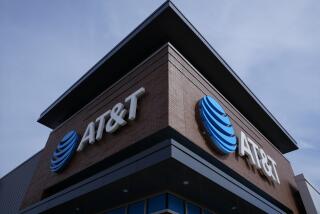Is the Phone System in the Pink--or on the Brink?
- Share via
Almost eight months after some telephone officials warned that skyrocketing Internet traffic threatened to overwhelm the phone network, a new study has found that “networks remain in a stable state and continue to provide a high level of reliability.”
The study--by a Washington-based phone industry standards group called the Alliance for Telecommunications Industry Solutions--did not specifically focus on the impact of the Internet. But it did catalog all telephone outages affecting 30,000 or more phone customers and lasting at least 30 minutes, and it found that the vast majority of the disruptions were caused by cable breaks. No outage affecting 30,000 or more phone customers, the study found, was triggered by overload or excessive demand.
The study, which is mandated by the Federal Communications Commission and conducted quarterly, is likely to reignite a debate over telephone reliability. Furor over the issue has smoldered since the telephone industry research consortium, Bellcore, issued a report last fall saying increased Internet traffic “poses an immediate threat to the capacity of the public switched network.”
The Bellcore report came on the heels of complaints by some local phone companies that a growing number of voice calls could not be completed because personal computer users were tying up lines for hours to surf the Internet.
Pacific Bell, for instance, said that before it installed new telephone network capacity in Silicon Valley last year, 16% of local calls could not connect because of the large number of Internet users on the phone network.
Raymond F. Albers, a Bell Atlantic executive who chaired the alliance’s study of outages, was out of town last week and could not be reached for comment.
But Cas Skrzypczac, a former Nynex Corp. executive who has helped prepare some of the alliance’s reliability studies and who is now group president of professional services at Bellcore, said the new study may not give an accurate portrayal of the impact of the Internet on the public phone network. That’s because the alliance is only required to report to the FCC outages lasting half an hour and affecting 30,000 or more people.
Skrzypczac said disruptions caused by the Internet don’t usually trigger such big outages, but rather produce “fast busy” signals or long waits for a dial tone on the overwhelmed phone lines.
“The criteria the FCC is using to track an outage would not necessarily uncover” the impact of growing Internet use, Skrzypczac said.
But Paul Misener, steering committee chairman of the Internet Access Coalition, a Washington group that has been fighting efforts by the phone companies to levy new phone charges on Internet access providers, said the new study bolsters his suspicion that the telephone companies began overstating the impact of Internet use on the telephone network at a time when the FCC was beginning an important overhaul of telephone rates.
“There were a lot of statements made last year by the phone companies during the lead-up to the [telephone] access charge debate, in which a few isolated incidents were cited as examples that a broader congestion of the network was developing due to Internet use,” Misener said. “As we can see now, the network itself is doing fine . . . and in the near term Internet traffic is not likely to be a serious problem.”




